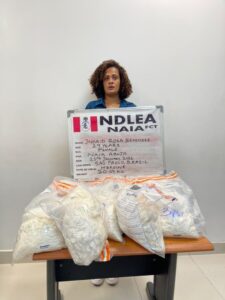Distress as petrol, naira scarcity persist nationwide.
13 min read
Distress as petrol, naira scarcity persist nationwide.
• Protests In Ibadan, Police Inspector Injured
• Makinde, Adelabu Suspend Governorship Campaigns
• Students Brutalise Soldier At ATM Point In UNIBEN
• Elderly Woman Faints In Port Harcourt Bank
• POS Operators Mop Up Cash At Petrol Stations, Markets, Dispense At 20% Profit
• Traders Lament Poor Sales, Ask Buhari To Intervene
Angry reactions have continued to trail the twin problems of lingering fuel scarcity and poor implementation of the Central Bank of Nigeria’s (CBN) cash swap policy that have left many citizens cash strapped and unable to attend to their basic needs for about three days now.
Many Nigerians who vent their frustrations to The Guardian lamented that while they were battling to adjust to purchasing fuel at N350 – N400 per litre or spending the whole day at the Nigeria National Petroleum Company Limited (NNPCL) petrol stations to buy at government’s regulated price of N185 per litre, the CBN compounded their woes with the haphazard execution of its naira re-design and swap policy.
The frustration has triggered a near situation of unrest across the country, with people lamenting that they have money in the banks but were going about hungry because they can’t access it.
In Lagos State, there were protests in some parts of the state against the policy last Thursday, even as some commercial banks had a hectic time trying to calm their customers who became unruly following their inability to have access to their money.
This was as Point of Sale (POS) operators have cashed in on the situation to fleece their customers who now pay between N800 and N1000 to withdraw N5,000. Findings by The Guardian also showed that traders and petrol stations were selling cash to residents who were in desperate need of cash at the rate of N1,000 per N10,000.
Meanwhile, queues yesterday persisted at the ATM points of commercial banks branches in the state even though they attend to only customers who have an account with them.
“I spent 2.30 minutes at the ATM point of one of the commercial banks, but could only withdraw N10,000. That was because I have an account with the bank. People who came with other banks’ ATM cards could only withdraw N1,000. What will I do with N1,000 in a weekend? The government must do something urgent before the situation gets out of hand. A hungry man is an angry man,” said a resident who asked for anonymity.
Bisi Adekunle, a resident in Oke Afa area of the state, said: “I was not born during the war, but I am old and educated enough to know the definition of war – Nigeria is at war again and when there is war, nothing works! My husband couldn’t return home yesterday, because he spent the whole day at a bank in Victoria Island. He said he had to sleep over at a friend’s place, as he couldn’t get money to transport back home.
“However, that wasn’t even as disturbing as the pain of knowing his family were at home and couldn’t feed because there is no money. I literally begged a neighbour for bread, so my children can have breakfast before going to school. I have never felt so embarrassed, but I had to do it. These children fed on leftovers all through yesterday and by this morning, there are no leftovers and, so I had to shamefully beg a neighbour for bread for them. She gave us but had her own lamentation of the present situation of the country that I was compelled to listen to before she gave the half loaf of bread. So, when I say we are at war, you may want to look around the situation with the masses. When there is no access to money there is hunger, strife and anger. Before you know it, young boys will get into crime, robbery and killing. I don’t even want to address the fuel and electricity scarcity because that seems like something that can be controlled or managed if there is access to money.
BRAND STORIES:
“If you have money, you can call the bluff of electricity providers and go for inverters until they return to their senses or even buy fuel from black marketers to power your generating set, however expensive. Although these are not acceptable resolves in a country that works, Nigerians have come to terms with the reality of being citizens in a country that doesn’t work, no thanks to our leaders, law and policy makers.”
On his part, Ademola Olatunji, said: “When money was in circulation, we were struggling to purchase fuel, but at least, we had the money. But now, there is no money! Even when you manage to have access to fuel, you can’t purchase as fuel attendants insist on cash only. They say the POS is not functional due to the poor bank network. At this point, I don’t know who to blame between President Muhammadu Buhari and the CBN Governor, Godwin Emefiele, who is supposed to know better, but unfortunately finds himself dancing to the tunes of Buhari who we all can’t wait to leave and give us some breathing space.”
In Oyo State, youths armed with dangerous weapons such as iron rods, stones, plastic chairs, broken bottles, among others, yesterday blocked the entrance of the State Secretariat and a portion of the road linking Bodija to the Secretariat axis with burn fire.
The protesters eventually forced their way into the state Secretariat and headed straight to the Governor’s Office where an Inspector of Police who was on duty was injured.
It was gathered that the injured officer, Dynasty Layemo, was stoned by the angry mobs while he was trying to prevent them from gaining access to the main Governor’s Office Complex. It was also learnt that the officer has been rushed to the clinic for proper treatment.
As at the time of filling this report, the state joint security outfit known as Operation Burst, some police officers, including Amotekun officers, were on ground to maintain law and order despite the fact that some civil servants on duty were panicking.
Reacting, the Executive Assistant to Governor Makinde on Security Matters, CP Sunday Odukoya (rtd), said the protest was out of place, because what was happening was affecting everybody.
“You can’t start destroying government properties because you are affected by government policies. The issues at hand affect everybody and the governments are working to bring an end to it,” he said.
Also, the angry youths were said to have invaded the Federal Secretariat at Ikolaba area of the state.
The tension in Oyo State has forced Governor Seyi Makinde and the governorship candidate of the Accord Party (AP), Chief Adebayo Adelabu to suspend their gubernatorial campaigns.
Makinde, whose campaign trail has visited some parts of the state, made the announcement during the flag-off of the Omi-Adio-Ido Road project yesterday.
The governor said the suspension was in solidarity with the people over the anti-people policies of the Federal Government.
A statement by the Commissioner for Information, Culture and Tourism, Dr. Wasiu Olatubosun, directed that all campaign activities be suspended until further notice.
Adelabu in a statement in Ibadan, said the suspension was necessary to sympathise with the people on the hardship they are going through as a result of the on going fuel scarcity and the naira redesigning.
The statement read: “I sympathise with Nigerians on their present predicament. To say times are hard is an understatement. No one is left out in this situation. People have money in the bank and they cannot access cash.
“I want to use this opportunity to call on government to as a matter of urgency address the problem. Our people cannot continue to suffer while politicians are dancing around at rallies. These are the people we want to govern.”
In Edo State, there was tension at the University of Benin (UNIBEN), Ugbowo campus, last Thursday, as some students engaged a lone soldier in fisticuffs from the nearby S&T Military Barracks.
In an online viral video, some students of the institution were seen brutalising the uniformed soldier as they shoved and kicked him for attempting to forcefully jump the queue at an ATM point at Ugbowo Campus.
Reacting to the incident, the Management of the University of Benin (UNIBEN) has appealed for calm, saying concerted efforts were being made to avert a reoccurrence.
The Vice chancellor, Prof. Lilian Salami, in a statement, yesterday, said the situation has been brought under control as the management of the school was in touch with top military officers at the barracks for an amicable resolution.
“The unfortunate incident of the clash between some students of our university and soldiers on Thursday, February 2, resulting from alleged resistance of students to the soldiers’ attempt to jump ATM queues on campus has been brought under control and the management of the university is in discussions with the hierarchy of the S & T for amicable resolution.
“The management acknowledges that these are challenging times for everyone and enjoins all to remain calm while efforts are being made to avert a re-occurrence.
“Management also calls on the students to constantly engage dialogue in resolving issues that concern them rather than taking to protests at any provocation, thereby causing more injury and damage to themselves and other citizens,” Salami said.
Read Also :NAIRA CRISIS: Filling station attendants, PoS operators make sharp business deals as cash becomes commodity
A visit to the branches of GTB, UBA, First Bank and Zenith banks in Port Harcourt yesterday showed that no ATM machine was dispensing either the old or new naira notes. As such, there was no queue at the ATM machines, though people clustered around the banking premises with frustrated looks. The banking halls were almost empty, as customers were also unable to withdraw any of the notes from the counters.
The bank workers were seen busying around, but doing nothing to help the stranded customers.
An elderly woman sighted at UBA Ikwere Road, Mile One, fainted after some minutes of walking round the bank.
In the past one week, a litre of fuel in the state sells at between N450 and N500.
Some parents, who spoke with The Guardian, lamented that they could no longer transport their children to school as a distance which motorists charged N200 now goes for N400. Many residents who could not foot the high cost of transport fare trekked very long distances.
Traders also complained of poor sales, as accessing cash has become increasingly difficult even as e-transfers do not come easily.
Displaying a declined e-transfer receipt of N14,000 at a supermarket, a resident, Uche Mark, said he had gone into the supermarket and picked goods since he could not buy anything at the open market due to lack of cash. But to his amazement, after the cashier summed up his purchases and he wanted to pay with his credit card, the transaction was declined.
According to him, the development left him frustrated as his family was waiting for him to return with food.
“For an individual to have money yet go hungry because he is not able to access his money is frustrating. This is the height of frustration I have ever seen,” Mark said.
Similarly, Friday Amadi, who has shutdown his business centre in Rumokoro axis of Port Harcourt, said after buying fuel at N450 per litre and increasing the cost of his services as a result, customers were not able to pay the new prices hence his decision to shutdown for the moment.
The situation in Asaba, the Delta State capital, was not different as residents expressed disappointment over what they encountered at various commercial banks in their bids to withdraw money for business transactions.
At Zenith Bank by Traffic Junction, The Guardian observed that there were long queues as customers struggled to get numbers issued by the bank security personnel as a means of getting access to ATM points to withdraw money.
One of the customers, Mrs. Karo Uche, said she arrived at the bank as early as 6:00am, had number 100, but withdrew money two hours after.
She said the difficulties to withdraw money were enormous, appealing to the authorities to “find solutions to the problems especially now that we are also facing fuel wahala”.
Uche said she managed to withdraw money through the ATM point, but was paid only N5000 of the new notes.
Another customer said she almost fainted at the Access Bank branch by FMC in Asaba in an attempt to withdraw money, “because when it got to my turn, ATM rejected my card, being a Union Bank card. I have been here since 6:20am and now heading to my Bank (Union) to face another queue. Which kind of country is this?”
Another customer also lamented: “When I came in here, the queue was long. But before it got to my turn, they said the machine ran out of cash. So most people left disappointed. Now, I’m here again because I need cash to go to the market and pay my child’s school fees. I was here early enough but I still met people already waiting. I was given number 70.”
In Kebbi State, Alhaji Usman Issa, a businessman in Birnin Kebbi, applauded the policy but said the implementation was too harsh on the masses.
“You can do it when the economy is favourable to the peoples. Like me, I had to leave home early in the morning and join the ATM queue so that I can have money in my pocket,” he said.
Residents of Kogi State also expressed very strong disapproval of the current situation. A motorist, Hamid Sule, told The Guardian that he bought fuel for N350 from a popular fuel station along Ganaja Road in Lokoja, the state capital, saying the transport fare to Anyigba from Lokojo had risen from N1,000 to between N2,000 and N2,500 due to fuel scarcity.
He wondered why the government would add to peoples’ suffering through the naira swap policy.
A visit to some commercial banks in Lokoja showed large crowds at the ATM points, POS points and the banking halls. Meanwhile, most of the banks visited were issuing between N2,000 and N5,000 to their customers.
A customer at one of the commercial banks said: “I came here since morning. After wasting time on the queue, they came out to announce to us that we could only get N5,000.”
A customer in another bank’s branch, who simply identified himself as Jimoh Ovoro, lamented that he was only given N2,000 of N20 denomination after waiting for several hours.
Displaying his N2,000, he called on the government to come to the aid of citizens.
Some of the POS points visited did not have money to dispense, while those who had were dispensing at exorbitant charges.
One Lamidi Ebunu said he paid N1,000 to get N10,000 of the old notes, noting that in some areas, N10,000 goes for N2,000.
In Imo State, the operators of POS operators have resorted to getting cash from traders and fuel stations, who now dispense fuel at N400 per litre.
The operators complained that the commercial banks do not give them the required amount on a daily basis.
“There is no enough cash. We now rely on the fuel station operators and traders in the market to get cash and dispense to the public. I got N2 million the other time, and sold at a high rate. I collect extra N700 per N5,000. We are also getting from goat, garri and traders of other commodities. The banks don’t have enough cash. Many ATM machines don’t have cash inside them. There are long queues. The situation is terrible,” a POS operator said.
Residents of Cross River also experienced serious difficulty yesterday as the scarcity of naira notes and petroleum products worsened in major cities.
In Calabar, a large number of the fuel stations were under lock and key. The few stations dispensing fuel at between N350 and N400 per litre had long queues while black marketers, who had a field day, sold at N5,000 per litre.
Residents seriously lamented their inability to get cash at the various commercial banks, noting that POS operators had tripled their charges.
A resident, Mr. Chukwuma Irechukwu, complained that he could only get N5,000 of N50 notes across the counter in one of the commercial banks. He lamented that he could not use the ATM because of the crowd.
“It’s annoying because I wanted to take N30,000. What will N5,000 do for me and my family for the weekend. This suffering is too much for the masses,” Irechukwu said.”
A POS operator at State Housing, Calabar, Miss Endurance Ikpi said: “Since morning I have been able to withdraw only N4,000 for the day at ATM instead of N20, 000. This is not good for our business. Please government should do something.”
Residents in Yenagoa, the Bayelsa State capital and the neighbouring towns and communities also groaned yesterday following the CBN cash swap policy and the lingering fuel scarcity.
With no electricity supply for weeks and prices of fuel increasing every other day, most of them could not even get cash from the banks and POS machines to go about their businesses.
Almost all the banks in the state capital were not dispensing cash at their ATM points.
Some small-scale business owners were the worst hit by the cash crunch. Mr. Chikeze Godfrey, who runs an eatery and a bar lamented that costumers were not coming to his shop because of scarcity of cash.
He said: “My brother, to be frank, since a week now, business have been slow. It was even worst last week when CBN was yet to give directives to extend the date of currency exchange. Even some monies transferred by customers last week, I’m yet to receive them.”
“As I’m talking to you right now, I can’t go to the market because there is no money. My wife was at bank for close to four hours but couldn’t get a dime.”
“I just pray that President Muhammandu Buhari should wake up from his slumber and address this quickly because many people are suffering including me, my family and my business,” Godfrey said.
However, in Jos, the Plateau State capital, there were signs of reprieve as the unprecedented long queues initially being witnessed at the ATM points as a result of the policy were gradually reducing following the apex bank’s directive to banks to be paying the new naira notes across the counter.
All the banks visited by The Guardian had queues for both ATM and over the counter withdrawal.
In most of the banks, numbers were given to customers according to how they came to avoid chaos, a development the customers applauded.
A tomato seller, Hussena Tanko, said he has not been finding things easy, as customers did not have money to buy goods and foodstuffs. He urged the Federal Government to address situation with a view to cushioning the effect on Nigerians.
Source:Guardian








